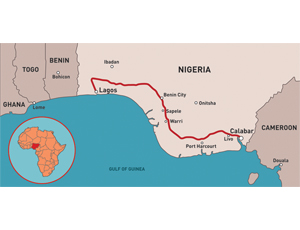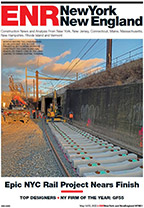China Railway Construction Corp. will export $4 billion worth of construction machinery, trains and steel products to Nigeria for the construction of the $11.97-billion Coastal Railway Project, whose final contract was signed in the West Africa nation’s capital, Abuja, in November.
The Chinese firm said that, under the contract, the largest single award for any Chinese company overseas, a single track of 1,402-kilometer-long standard-gauge railway will be constructed to link the commercial city of Lagos to the eastern port city of Calabar on the Nigerian coast.
CRCC said the deal was preceded by a framework contract, signed in May, between Nigeria’s ministry of transport and the company’s subsidiary China Civil Engineering Construction Corp. (CCECC).
CRCC previously said the $11.97 billion is equivalent to 12.53% of the company’s operating revenue for the 2013. However, the company could not confirm the project's deadlines or how the financing will be sourced, although many of its projects abroad have been financed largely by the Export-Import Bank of China.
CCECC currently is involved in the construction of the Lagos mass-transit rail system and the 186-km-long Abuja-Kaduna standard-gauge rail project, both funded mostly by the EX-IM Bank of China.
The Lagos-Calabar railway line, which CRCC chairman Meng Fengchao said is “a mutually beneficial project,” will create an additional 200,000 jobs, a major step in enhancing China-Nigeria relations and trade, estimated at $13.6 billion last year.
Plans for the new railway line, which will have 22 stations, come at a time when analysts have expressed concern over declining freight and passenger numbers linked to poor infrastructure and mismanagement of the railway sector. Nigeria currently moves an estimated 2.5 million passengers and 1 million metric tonnes of freight every year.
“The amount of freight carried had declined due to deterioration of the level of service and competition from road transport and the poor condition of the infrastructure and rolling stock,” says the African Development Bank.
“The declining quality of railway assets and train services has also led to the disappearance of intermodal transport nodes and further decline in traffic volumes,” the bank also notes.
During his recent visit to Africa, Chinese Premier Li Keqiang said, "Nigeria emphasizes development of railway and other infrastructure, while China possesses technical strength and rich experience in this regard."



Post a comment to this article
Report Abusive Comment